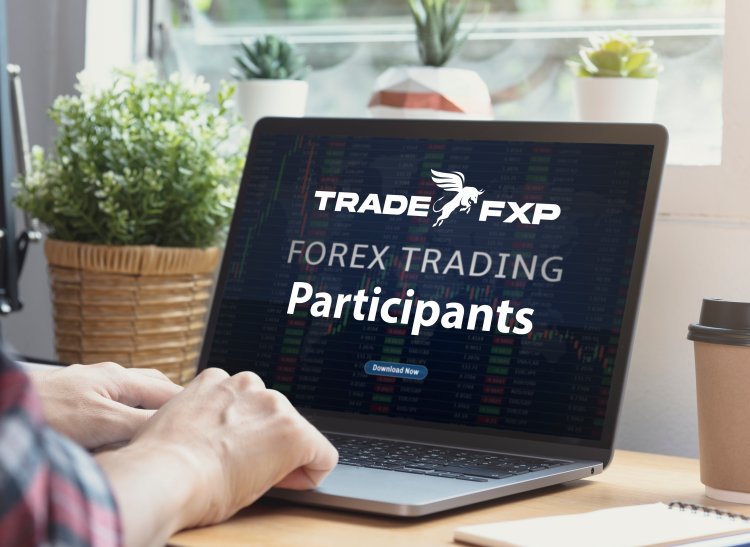Forex Market Key Participants
Discover the main players in the Forex market at TradeFXP blog. Understand their roles, influence, and strategies in global currency trading. Join us!

Forex Market Participants
The foreign exchange market is a large marketplace where people trade currencies from other countries. This market is dominated by five types of traders: central banks, commercial and investment banks, institutional investors, retail traders, and large corporations. Central banks are essential because they control the money in their country and can modify its value. Banks and large investors can also influence the value of money in the foreign exchange market.
The foreign currency market, sometimes known as forex, is the world's largest financial market, with a daily trade volume of over $5 trillion. As a result, it's critical to understand who the important players in forex are, as their actions have a significant impact on the market's dynamics. Central banks, commercial and investment banks, institutional investors, individual traders, and multinational corporations are the five primary types of currency participants.
Central banks are important in forex because they manage a country's monetary policy, which impacts the value of its currency. They are in charge of determining interest rates, managing inflation, and controlling the money supply. Central banks can also buy or sell their currency in the FX market to impact supply and demand. Traders actively monitor central banks' actions since they can have a substantial impact on the FX market.
Commercial and investment banks are among the main currency market participants. They add liquidity to the market by engaging in currency transactions on behalf of their clients or themselves. Banks use the forex market to hedge currency risks for their customers or portfolios. Banks may engage in speculative trading in some situations, wagering on which direction a currency will go. They have access to a big amount of capital, allowing them to influence currency markets by purchasing and selling large amounts of money.
Institutional investors, such as hedge funds and pension funds, play an important role in the currency market. They manage significant sums of money for their clients and invest in a variety of assets, including currencies. To capitalize on market opportunities, institutional investors often employ complex trading methods that leverage their size and expertise. With their huge trades, they are known to increase volatility in the forex market and can cause significant price swings in the currency pairings they trade.
The Evolution of Forex Trading
Forex trading has existed for quite some time. People traded numerous currencies even in ancient times. Gold and silver were vital in trading during the nineteenth century, but the US dollar is currently the dominant currency. Many people now trade currencies through internet platforms and mobile apps. It is fairly simple to engage in forex trading from anywhere in the world.
Forex (FX) trading has a long and distinguished history and is not as new as many people believe. Foreign currency trade dates back to ancient times when wandering merchants swapped currencies to conduct business. Nonetheless, it was not until the nineteenth century that foreign exchange markets began to take on the form that they have today.
Gold and silver were important commodities in worldwide trade during the early nineteenth century. The introduction of the gold standard in 1875 standardized currencies to a fixed amount of gold, assisting in the stabilization of trading activity even during times of crisis. The gold standard was suspended during World War I, with participants instead focusing on pegging their currencies to the US dollar. The Bretton Woods System, founded in 1944, cemented the US dollar as the preferred worldwide currency, replacing gold as the standard currency unit.
Forex trading has developed significantly in recent years, with a slew of new participants entering the market every day. Its expansion is partly due to technological developments in communications and transportation, which allow people to easily exchange currencies regardless of their physical location. With the advent of internet trading platforms and mobile apps, it is now easier than ever to trade forex from anywhere in the world. Every day, hundreds of millions of people throughout the world engage in forex trading.
Several Types of Forex Traders
Forex trading is the exchange of money between two countries. Several kinds of traders trade in various ways. Some traders enjoy making quick deals and earning tiny sums of money each time. Other traders like to focus on the big picture and hold their deals for an extended period. Some, however, prefer to trade often throughout the day, relying on charts and patterns to make quick selections. To make money, they must all work hard and be astute.
The process of trading currencies from various countries throughout the world is known as forex trading, sometimes known as foreign exchange trading. Governments, banks, businesses, and private investors are among the major players in this sector. Yet, one of the most essential aspects of forex trading is the variety of traders. Based on their trading tactics and market analysis approaches, these traders can be divided into numerous categories.
The "scalper" is the initial form of currency trader. This trader seeks to make a little profit on each trade by quickly purchasing and selling currency pairs. Scalpers typically seek price changes of a few pips and attempt to profit from them by executing short-term trades. Scalping can be dangerous since it requires a high level of precision and quick decision-making abilities. Successful scalpers, on the other hand, can typically produce a consistent income by being focused and adhering to a specific trading plan.
The "position trader" is another form of forex trader. Long-term patterns and economic fundamentals are often of interest to position traders. They meticulously examine the markets to detect important patterns that are likely to remain over time. Once they've detected these trends, they'll hold their positions for extended periods, frequently weeks or months, to maximize their gains. Position traders typically have extensive expertise and a thorough understanding of the economic dynamics that influence currency values.
The "day trader" is the final category of FX trader. Day traders frequently trade many times each day, buying and selling currency pairs depending on short-term price fluctuations. To make their trades, day traders typically rely heavily on technical analysis, employing charts and other tools to spot trends and support and resistance levels. Day traders must also be able to recognize trends in the market and make quick judgments based on these patterns. By trading regularly and remaining consistent in their approach, successful day traders can often earn a good living.
Brokers' Role in Forex Trading
Forex trading is the buying and selling of various types of money. Forex Trading Brokers facilitate this by linking buyers and sellers and providing trading tools. They also guide them and assist them in remaining safe while trading. It is critical to select a reliable broker to assist you in trading successfully.
Forex trading is a sophisticated and competitive market in which dealers purchase and sell currencies. From institutional investors to retail traders, a variety of actors contribute to the success of forex trading. Brokers are an important component in forex trading because they ensure the seamless flow of transactions between traders and the market. This article discusses the function of brokers in forex trading.
Brokers act as go-betweens for traders and the currency market. Their major function is to match buyers and sellers to enable exchanges for their clients. They also provide clients with access to trading platforms where they may study markets and make deals. Brokers also provide clients with leverage, which allows traders to trade larger positions with less cash. Brokers profit on the difference between the bid and ask prices of currency pairs, which is known as spreads. The principal source of income for a broker is a markup or commission on the spread.
Brokers provide traders with financial assistance as well as educational tools. They provide free demo accounts, allowing traders to practice trading with virtual money before registering a real account. Brokers also offer market analysis, news updates, and charting tools to assist traders in making sound trading decisions. They keep their clients up to date on market developments that may affect their trading. Because forex trading is dangerous, brokers provide risk management tools such as stop-loss orders to help traders protect their capital.
Finally, as mediators between traders and the market, brokers play an important role in forex trading. They connect buyers and sellers, provide access to trading platforms, and charge a fee for leverage. Brokers often offer value-added services such as financial advice, instructional materials, risk management tools, and market analysis to help traders make informed decisions. As a result, traders should choose a trustworthy broker to ensure a fruitful forex trading trip.
The Role of Central Banks in the Forex Market
Central banks are significant because they assist manage how much money is utilized in a country while also attempting to keep the economy healthy. To assist with this, they can modify the amount of interest consumers must pay when borrowing money. This can cause the value of money to rise or fall, affecting how much products cost in other nations. Central banks will occasionally buy or sell money to assist maintain its value constant. Those who trade money (such as businesspeople) must keep an eye on what central banks are doing.
Central banks are among the most essential major actors in the currency market that investors should be aware of. Central banks are institutions that oversee a country's or region's monetary policy to promote economic growth and financial stability. They are also in charge of implementing interest-rate policies, supervising the financial sector, and managing inflation. Central banks have a big impact on the currency market due to their critical role in governing national economies.
Interest rate choices by central banks have a direct impact on the currency market because they are one of their primary weapons for regulating the money supply. Most central banks adjust interest rates to steer their economies, frequently boosting them to combat inflation and decreasing them to stimulate growth. Changes in interest rates can cause major volatility in currency markets because they drive capital flows between countries based on where investors can get the best returns. These changes also have an impact on currency exchange rates, since higher interest rates attract foreign investors, causing the currency to appreciate, whereas lower interest rates cause the currency to depreciate.
Central banks' trading operations also have an indirect impact on the FX market. Several central banks have the authority to intervene in the forex market by purchasing or selling their currency to influence exchange rates. When central banks intervene, it is usually to stabilize their currency and prevent excessive volatility that can harm their economy. For example, if a country's currency is rising too quickly, increasing the cost of exports and harming the economy, the central bank may intervene by selling its currency to weaken it. The inverse would be true if a currency depreciated too quickly. The intervention of central banks can affect the supply and demand for the currency in question, potentially leading to short-term fluctuations.
In conclusion, central banks play an important role in the FX market. Their monetary policies and interest rate decisions can have an immediate impact on currency supply and demand, and their power to intervene in the forex market can influence exchange rates. As a forex trader, it is critical to monitor central bank statements, speeches, and policy changes since they might signal prospective forex market moves. It's also crucial to remember that central bank operations are long-term in nature, and forex traders must keep this in mind to fully understand their impact on the markets.
We hope this article may have helped you understand the forex market and trading. It is important that in this era of uncertainty, we all need a side hustle and income. Trading Forex is the best that it is. Please don't ever think of trading as gambling. Everyone can sing, but only a few can SING. It is a calling. For all those who want to make money in Forex trading without doing the deed of strenuous trading - CLICK HERE.
Happy Trading
To read more interesting articles CLICK HERE
Why do you need to be with TradeFxP? CLICK HERE
To join our Hunter AutoBot Trading Program CLICK HERE
All About TradeFxP's Hunter Ai EA Autobot CLICK HERE



 admin
admin 










